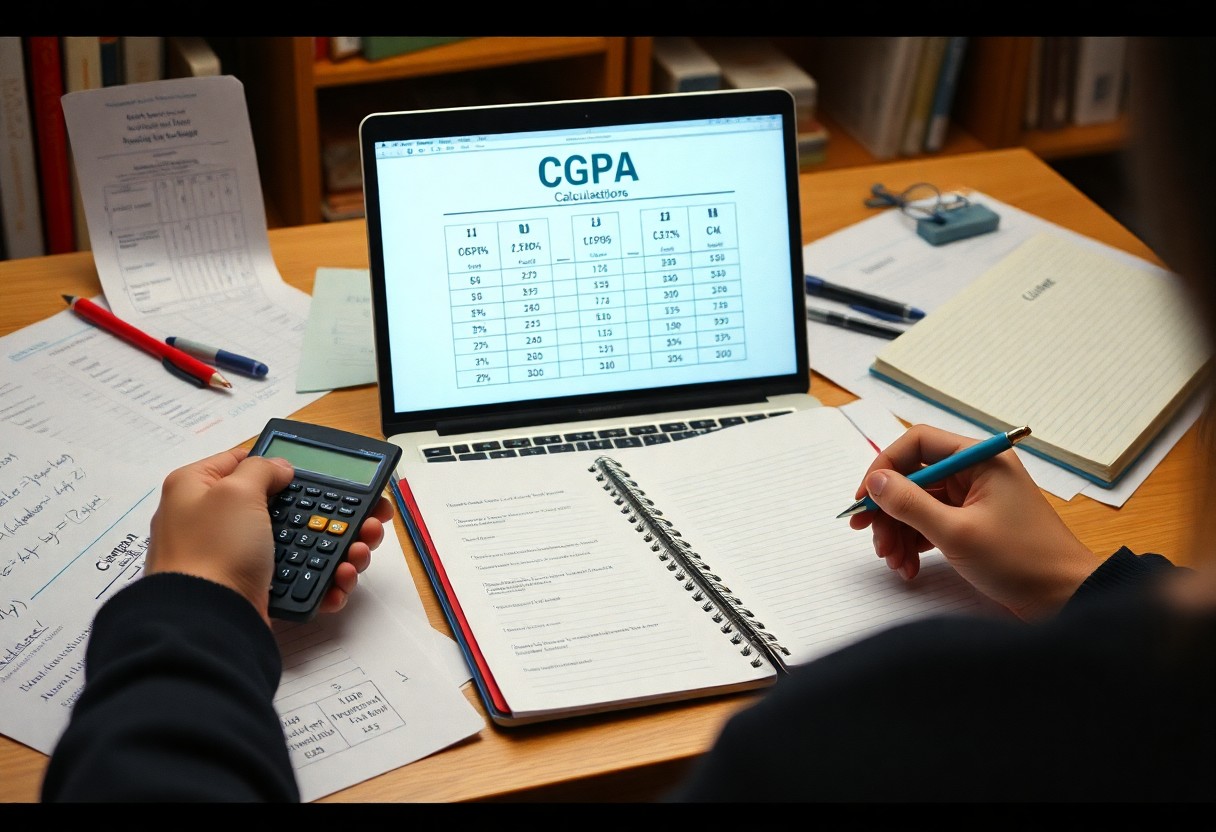There’s a straightforward method to calculate your CGPA from your percentage, which is imperative for students aiming to understand their academic performance. By following a simple formula, you can easily convert your percentages into the CGPA system, allowing you to gain a better insight into your overall grades. This guide will walk you through the process step-by-step, ensuring you achieve an accurate understanding of your academic standing. Knowing how to perform this conversion can also enhance your academic planning and future opportunities.
Table of Contents

Key Takeaways:
- Understand the Conversion Formula: To convert percentage to CGPA, use the formula CGPA = (Percentage / 100) x 10.
- Consider the Weightage: Ensure you know the weightage of each subject, as this affects overall CGPA calculations.
- Practice Consistently: Regularly practice conversions with various percentages to become proficient in calculating CGPA accurately.
Understanding CGPA
While you pursue your academic goals, understanding Cumulative Grade Point Average (CGPA) is vital in monitoring your progress. CGPA provides a clear representation of your overall performance across various subjects throughout your academic tenure, allowing you to aim for improvement and set achievable standards for yourself.
Definition of CGPA
Now, CGPA stands for Cumulative Grade Point Average, which is a standardized system for evaluating your academic performance. It aggregates your grades over multiple semesters into a single score, reflecting your proficiency across various subjects.
Importance of CGPA
Clearly, CGPA serves as a vital indicator of your academic stamina and capability. It often influences opportunities such as internships, scholarships, and job placements, making it an vital factor in your educational journey.
For instance, a higher CGPA can enhance your eligibility for competitive programs, opening doors to prestigious internships or scholarships. Additionally, a strong CGPA demonstrates to potential employers that you possess the discipline and commitment necessary for success. An impressive CGPA can be a decisive element, particularly in job selection processes, where employers often scrutinize academic performances as a measure of your capabilities. Your CGPA not only reflects your intelligence but also your work ethic; thus, maintaining a solid average is imperative for your future.
Converting Percentage to CGPA
You may find it necessary to convert your percentage to CGPA, especially when applying for higher studies or jobs. Understanding this conversion helps you assess your academic performance in a standardized manner. The conversion process is straightforward, allowing you to express your achievements in a format widely recognized by educational institutions.
General Formula for Conversion
One way to convert your percentage to CGPA is by using a simple formula. Generally, the formula is: CGPA = (Percentage / 100) × 10. This formula gives you a direct conversion, making it easy to assess your academic standing.
Step-by-Step Calculation Process
Process the conversion in a systematic manner. Below is a step-by-step guide to ensure an accurate calculation:
Step-by-Step Guide
| Step 1 | Write down your percentage. |
| Step 2 | Divide your percentage by 100. |
| Step 3 | Multiply the result by 10. |
In executing these steps, you ensure an accurate CGPA representation. Make sure to check your calculations for any errors, as inconsistencies could lead to a misrepresentation of your academic performance.
Formula
| Percentage | CGPA |
| 90% (example) | 9.0 |
| 80% (example) | 8.0 |
By following the steps outlined and utilizing the provided formula, you can easily convert your percentage into CGPA. This skill will empower you when it comes to presenting your academic achievements to educational institutions and potential employers.
Tips for Accurate Calculation
Despite the simplicity of calculating your CGPA from percentage, ensuring accuracy is vital for achieving reliable results. Follow these helpful tips:
- Always check your grading system
- Use precise values for each subject
- Document your calculations for reference
- Get a second opinion on your results
Knowing these tips can help you maintain accuracy in your calculations.
Ensuring Consistent Grading Scales
To guarantee accurate CGPA calculations, you must use a consistent grading scale throughout your academic journey. Different institutions may adopt varying scoring systems, so always verify the scale used by your courses. This will prevent any discrepancies that could impact your overall CGPA.
Double-Checking Results
To ensure accuracy in your CGPA calculation, it’s vital to double-check your math and the figures you’ve entered. A simple arithmetic mistake can lead to significant differences in your final score.
With a thorough review, you can avoid common pitfalls that may skew your CGPA. Always verify the total credits and grades before finalizing your calculations. Mistakes in these areas can severely impact your academic performance. Additionally, getting a trusted peer or academic advisor to review your results can provide an extra layer of assurance. Using these strategies, you’ll gain confidence in your calculated CGPA.
Factors Influencing Percentage and CGPA
To understand the dynamics of your academic performance, consider several factors that can influence your overall percentage and CGPA. These include:
- Weightage of Subjects
- Grading Criteria Variations
- Course Difficulty Level
- Assessment Methods
- Attendance
Thou must weigh these elements as you evaluate your academic standing.
Weightage of Subjects
Now, the weightage of subjects plays a significant role in determining your final outcomes. Certain subjects may carry more credit, affecting how your scores translate into overall performance.
Grading Criteria Variations
Grading systems can differ significantly across institutions, impacting your CGPA. Each university has its own formula for translating raw scores into grades, which can lead to disparities in perceived performance.
A careful examination of your institution’s grading criteria is crucial. For instance, while some schools use a straightforward percentage-to-grade conversion, others may have complex weightings that assign different values for assignments, exams, and projects. Understanding these variations can significantly affect how you interpret your CGPA and overall academic performance. Stay informed about your institution’s policies to make data-driven adjustments for your academic strategies.

Common Mistakes to Avoid
Not taking the time to understand the calculation process can lead to miscalculating your CGPA. It’s important to pay attention to each step of the conversion, including how grades are weighted and what percentage corresponds to each grade. Overlooking these details can distort your final result, affecting your academic evaluation and future opportunities.
Misunderstanding the Grading System
Misunderstanding your institution’s grading system can lead to inaccurate CGPA calculations. Each school may have different scales, weights, or conversion percentages for grades. Familiarizing yourself with your specific system is crucial to ensure your calculations reflect your true academic performance.
Incorrect Percentage Inputs
Even a small error in the percentage inputs can lead to inaccurate CGPA results. When entering your grades, ensure they are correct and correspond to the proper subjects and credits. A moment’s oversight might significantly affect your overall calculation.
Incorrect percentage inputs not only skew your CGPA but may also create misleading representations of your academic performance. Always cross-verify your grades before calculation. Ensure that you input the exact percentages received for each subject, as even a minor mistake can lead to a significant difference in your final CGPA. Take the time to double-check and confirm that all entered values are accurate to prevent any miscalculations that could jeopardize your academic record.
Resources for Further Assistance
All the information provided can be overwhelming, but there are plenty of resources available to assist you in your CGPA calculation journey. Whether you prefer using online tools, consulting with your educational institution, or exploring academic forums, you can find the help you need to simplify the process.
Online CGPA Calculators
Clearly, online CGPA calculators offer a user-friendly interface where you can input your percentage scores and quickly receive your CGPA. These tools save you time and eliminate any errors, making them an excellent option for students looking to streamline the calculation process.
Educational Institution Guidelines
To ensure accuracy in your calculations, refer to your educational institution’s specific guidelines on CGPA calculations. Most institutions have their own formula or grading system, which might differ from general practices.
Plus, it’s important to contact academic advisors or consult your institution’s website for the most accurate and relevant information. Additionally, these guidelines often highlight how different courses affect your CGPA. Ignoring institutional requirements can lead to misinterpretation and affect your academic record. Keeping yourself informed with these resources can lead to a better understanding of your academic standing.
Summing up
The process of calculating your CGPA from percentage involves a simple formula where you divide your percentage by a set multiplier, typically 9.5, to convert it accurately. This method ensures you have a reliable way to assess your academic performance in CGPA terms. For an easier approach, you can utilize online tools like the Percentage To CGPA Calculator – Best % to CGPA Converter, which streamlines the conversion and offers precise results with minimal effort.
Q: How is CGPA calculated from a percentage?
A: To calculate CGPA from a percentage, you first need to understand the conversion formula applicable to your educational system, as it may vary. Generally, a common method is to divide the percentage by a specific constant, most often 20 or 10, depending on the grading system you are following. For instance, if your percentage is 80%, the CGPA would be calculated as:
CGPA = Percentage / 20 = 80/20 = 4.0.
This method gives a CGPA on a scale where the maximum is often 10. Always verify with your institution for the formula they adhere to.
Q: Are there different scales for calculating CGPA from percentage?
A: Yes, different educational institutions and examination boards may follow varying scales for converting percentage to CGPA. While some use a scale of 4.0, others might use 6.0 or 10.0. It is important to consult your specific institution’s guidelines to determine the scale used for the conversion. For example, if your institution uses a scale of 10, then dividing the percentage by 10 might be appropriate. Always check your syllabus or speak to academic advisors for the correct conversion scale.
Q: Can CGPA be calculated for different subjects separately?
A: Yes, CGPA can be calculated for individual subjects, especially if they consist of different credit hours or weightage. To find the CGPA for a subject, you would first convert the percentage score of that subject into CGPA using the appropriate formula. Then, consider the credit hours: multiply the CGPA of each subject by its respective credit hours, sum these results, and divide by the total credit hours for all subjects. This process will yield a final CGPA that accurately reflects individual performance across different courses.